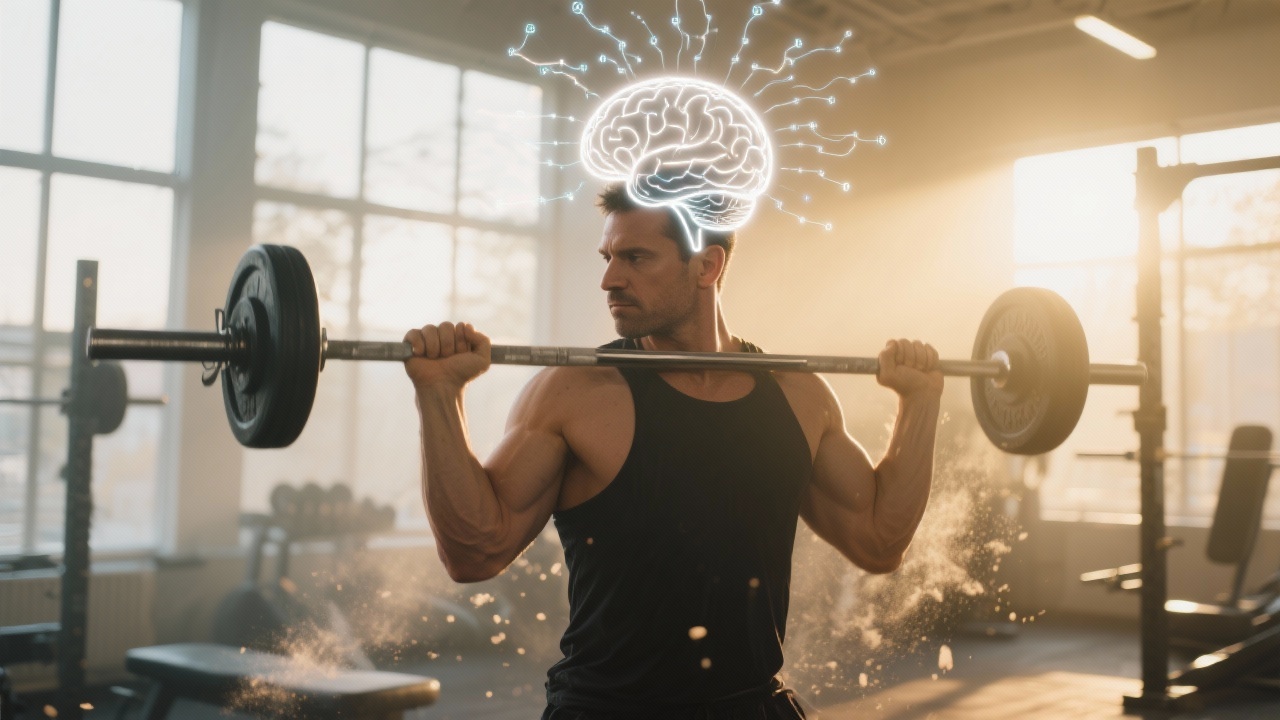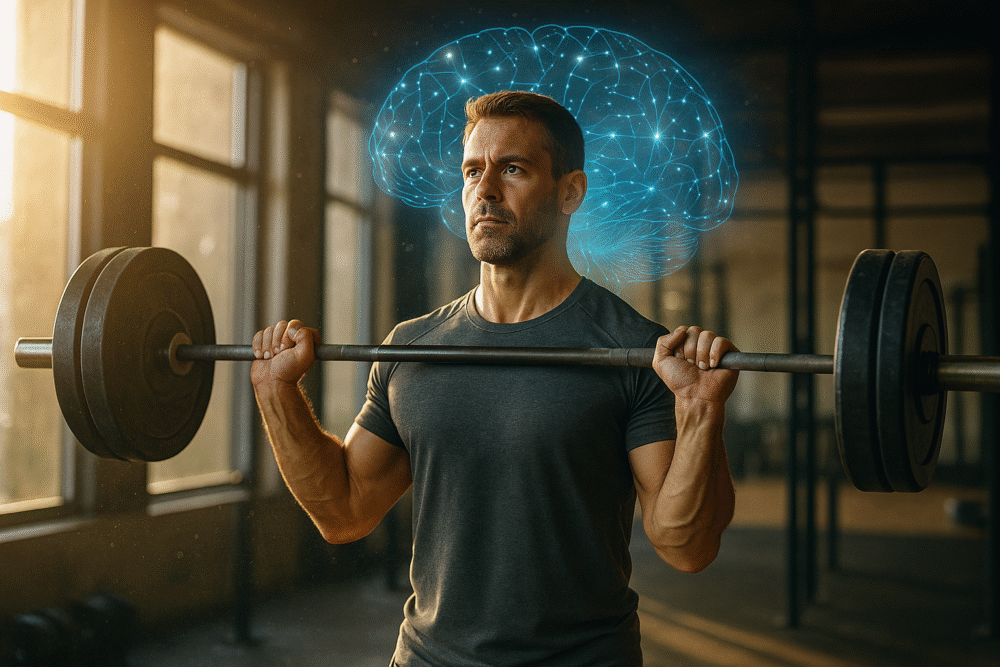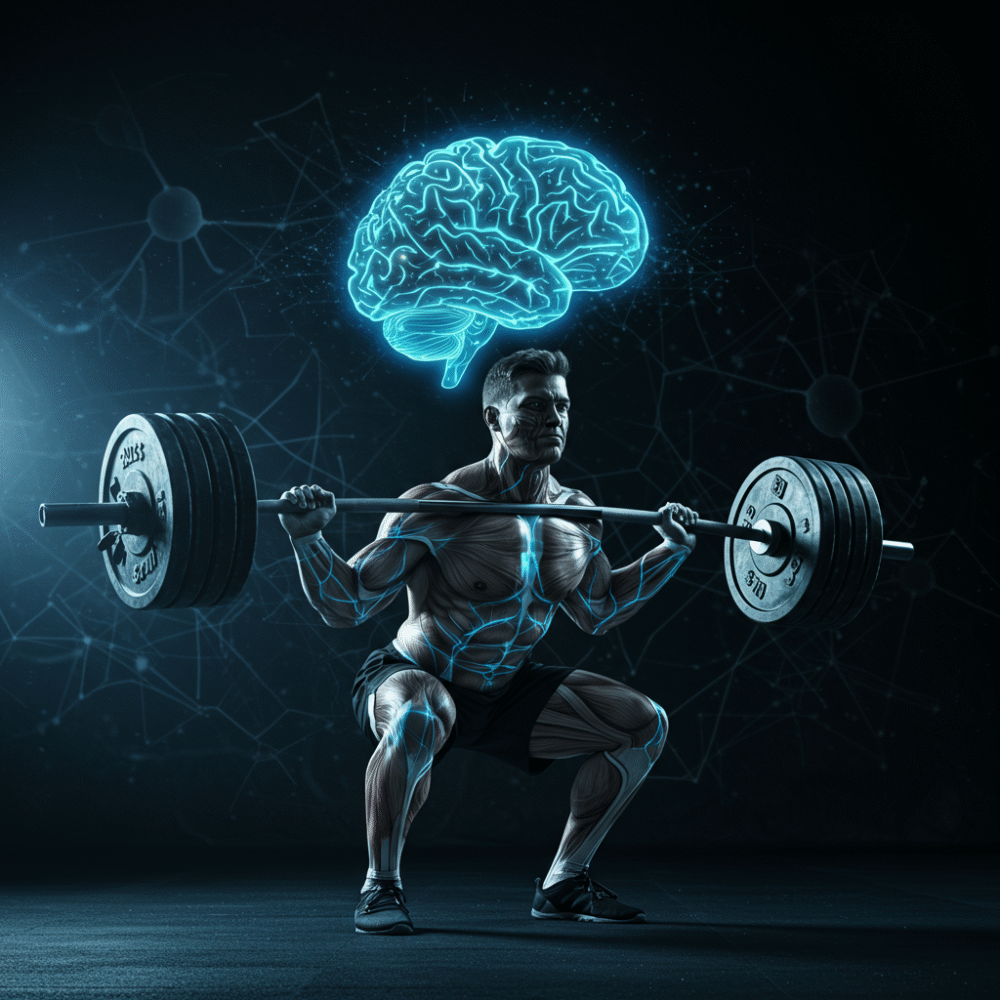Strength Training And Brain Health: The Hidden Link Between Muscle and Mind

Discover how Strength Training and Brain Health unite to boost focus, discipline, and emotional resilience—revealing the secret science behind mental mastery.
Introduction
Modern men build bodies but neglect the brain that commands them. The gym has become a temple for physical power—but most lifters never realize that every deadlift, every press, every rep is sculpting their mind just as much as their body.
The mainstream narrative says strength training builds muscle mass, boosts testosterone, and burns fat. True—but incomplete. The deeper truth? Strength Training and Brain Health are inseparable, and this connection fortifies focus, confidence, and emotional balance.
When I trained in CrossFit, I learned that iron doesn’t just test the muscles—it tests the mind. The moments between exhaustion and triumph are neural battlegrounds where resilience is forged. Neuroscience now validates what warriors have always known: movement is medicine for the mind.
Every time you engage in Strength Training and Brain Health practices together, you enhance not only your physique but your mental capacity for stress and clarity.
This article reveals how Strength Training and Brain Health sharpen mental health, the neuroscience behind it, and how to train your body in ways that elevate your mind.
Understanding the Connection Between Strength Training and Brain Health
The concept of Strength Training and Brain Health isn’t a trend—it’s a scientific reality. Resistance training triggers neurochemical changes that improve how we think, feel, and function. It builds both physical and cognitive endurance.
When you lift weights, your brain releases brain-derived neurotrophic factor (BDNF)—a protein that supports neurogenesis, synaptic plasticity, and cognitive resilience.
Think of BDNF as the brain’s growth hormone. Combined with elevated endorphins, dopamine, and serotonin, Strength Training and Brain Health synergy produces a biochemical symphony that enhances mood, clarity, and motivation.
The Mental Strength Toolkit defines this intersection as Control, Commitment, Challenge, and Confidence—the 4 C’s of Mental Strength. Strength training activates all four dimensions, building a stronger, more balanced mind.
When practiced with intention, Strength Training and Brain Health become the ultimate cognitive enhancement strategy—a deliberate act of conscious self-reprogramming.
Why Strength Training and Brain Health Build a Stronger Brain
The brain thrives under challenge. Every repetition strengthens not just muscle fibers but neural pathways. Strength Training and Brain Health combine neuroplasticity and physical exertion to create a feedback loop of focus and adaptation.
Dr. Andrew Huberman’s research confirms that effort-based dopamine reward loops strengthen motivation and learning. That means the more you exert yourself during Strength Training and Brain Health sessions, the greater your capacity for focus and resilience becomes.
CrossFit exemplifies this perfectly. Its structure—constantly varied, high-intensity, functionally driven—forces the brain to anticipate, adapt, and recover rapidly. Over time, it enhances mental agility, decision-making, and emotional regulation.
You aren’t just lifting weights—you’re rewiring your nervous system. Strength Training and Brain Health work as one discipline to sharpen awareness and build fortitude.

The Psychological Benefits: From Depression to Discipline
Strength Training and Brain Health practices are now recognized as powerful non-pharmaceutical treatments for depression and anxiety. Studies show that just two to three resistance sessions per week can significantly reduce depressive symptoms. Why? Because strength training teaches the nervous system how to handle stress rather than collapse under it.
Each rep becomes a mental rehearsal for resilience. You learn to push through discomfort, control your breathing, and focus when the world tells you to quit.
That is emotional regulation in motion—a form of embodied mindfulness. By combining Strength Training and Brain Health, you train the mind to stay calm in chaos and the body to express mental precision.
In a world addicted to comfort, Strength Training and Brain Health reintroduce the sacred art of struggle. That’s where growth happens. The body becomes the forge for mental freedom.
Common Myths About Strength Training and Brain Health
| Myth | Truth |
|---|---|
| Strength training is only about aesthetics | Strength Training and Brain Health are about neuro-sculpting: building focus, discipline, and resilience. |
| Cardio is better for mental health | Resistance training supports long-term confidence and mood balance through neurochemical regulation. |
| It’s only for young men | Strength Training and Brain Health benefit every age group, slowing cognitive decline and improving vitality. |
| It causes stress and fatigue | Properly programmed, it reduces cortisol and strengthens the nervous system for stress management. |
The truth dismantles surface-level fitness culture. Strength Training and Brain Health transcend vanity—they build a mind that cannot be broken.

The Warrior’s Framework: Training Body and Brain in Sync
Use Strength Training and Brain Health to align your Four Pillars of Strength:
1.) Physical Strength (The Warrior): Prioritize compound lifts that engage the nervous system. Focus on posture, breath, and control to awaken awareness and power.
2.) Mental Strength (The Magician): Use mental rehearsal and visualization before each lift to create neural precision. Breathe consciously to regulate the nervous system.
3.) Emotional Strength (The Lover): Train in community to boost belonging and accountability. Reflect after each session to build awareness and emotional intelligence.
4.) Spiritual Strength (The King): Anchor every workout in purpose. Align physical discipline with higher meaning. When Strength Training and Brain Health unite, the gym becomes sacred ground.
When these pillars align, your body and brain function as one coherent system. Strength Training and Brain Health merge physical effort with conscious intention.
Real-Life Example: CrossFit as Cognitive Training
In my CrossFit training, I discovered how Strength Training and Brain Health blend into one practice. During an intense workout combining heavy thrusters and pull-ups, my body was near failure—but my mind stayed locked in. That’s when I realized: the body quits when the mind disconnects. Once I re-engaged mentally, everything shifted.
That’s the core of Strength Training and Brain Health—conscious endurance. You’re not just lifting weight; you’re training the brain to command the body through chaos and fatigue.
Mistakes to Avoid
✔️ Training without intention: ignoring how Strength Training and Brain Health feed each other. Physical effort without focus wastes energy.
✔️ Neglecting recovery: overtraining the body weakens the brain. Balance effort with restoration.
✔️ Chasing aesthetics: ego-driven training ignores consciousness. Strength Training and Brain Health thrive on alignment, not vanity.
✔️ Ignoring emotion: recovery includes mental reset. Strength Training and Brain Health require emotional rest and integration.
Advanced Strategies for Mental Resilience
Contrast Training: Combine heavy lifts with meditation or breathwork to link exertion and calm. This keeps Strength Training and Brain Health balanced.
Cognitive Load Integration: Count reps backward or by intuition to sharpen focus and adaptability. You’re conditioning the mind-body connection.
Flow Tracking: Journal peak moments from your workouts to identify mental triggers. Strength Training and Brain Health deepen awareness through reflection.
Ritualize Resistance: Begin each session with a mantra. Intentional lifting transforms training into meditation in motion.
Q&A Section
How does Strength Training and Brain Health improve mindset?
By increasing BDNF and dopamine, Strength Training and Brain Health enhance resilience, motivation, focus, and emotional balance through continuous neurological adaptation. This powerful synergy promotes mental clarity, cognitive endurance, and self-confidence, enabling optimal peak performance for daily productivity and long-term psychological well-being.
Can Strength Training and Brain Health reduce stress?
Yes. The combination lowers cortisol and improves adaptability to pressure, retraining the body and brain to respond instead of react. Regular integration of Strength Training and Brain Health practices improves emotional regulation, enhances sleep quality, and reduces anxiety through optimized neurochemical balance and mindfulness under physical exertion.
How often should I practice Strength Training and Brain Health routines?
Two to four times weekly sustains hormonal balance, neuroplastic growth, and clarity. Consistency rewires both body and mind while optimizing performance, stabilizing energy levels, and cultivating mental sharpness through strategic progression and recovery aligned with neuroscience-based training principles.
Does Strength Training and Brain Health improve focus at work?
Absolutely. The same mechanisms that sustain intense workouts sharpen executive decision-making, concentration, and problem-solving skills. Strength Training and Brain Health elevate cognitive processing, increase productivity, and improve stress management, resulting in more efficient task execution and heightened creative insight throughout professional environments.
Is Strength Training and Brain Health suitable for older adults?
Yes. Research shows these practices slow cognitive decline, boost energy, and sustain motivation—regardless of age or experience. Strength Training and Brain Health help preserve neural elasticity, enhance mobility, and foster long-term mental health, ensuring vitality, longevity, and sustained independence for mature individuals.


